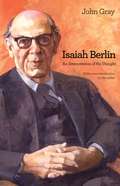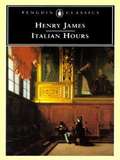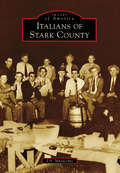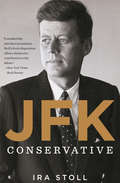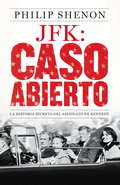- Table View
- List View
Isaiah Berlin: An Interpretation of His Thought
by John GrayIsaiah Berlin (1909-1997) was the greatest intellectual historian of the twentieth century. But his work also made an original and important contribution to moral and political philosophy and to liberal theory. In 1921, at the age of eleven, Isaiah Berlin arrived in England from Riga, Latvia. By the time he was thirty he was at the heart of British intellectual life. He has remained its commanding presence ever since, and few would dispute that he was one of Britain's greatest thinkers. His reputation extends worldwide--as a great conversationalist, intellectual historian, and man of letters. He has been called the century's most inspired reader. Yet Berlin's contributions to thought--in particular to moral and political philosophy, and to liberal theory--are little understood, and surprisingly neglected by the academic world. In this book, they are shown to be animated by a single, powerful, subversive idea: value-pluralism which affirms the reality of a deep conflict between ultimate human values that reason cannot resolve. Though bracingly clear-headed, humane and realist, Berlin's value-pluralism runs against the dominant Western traditions, secular and religious, which avow an ultimate harmony of values. It supports a highly distinctive restatement of liberalism in Berlin's work--an agnostic liberalism, which is founded not on rational choice but on the radical choices we make when faced with intractable dilemmas. It is this new statement of liberalism, the central subject of John Gray's lively and lucid book, which gives the liberal intellectual tradition a new lease on life, a new source of life, and which comprises Berlin's central and enduring legacy. In a new introduction, Gray argues that, in a world in which human freedom has spread more slowly than democracy, Berlin's account of liberty and basic decency is more instructive and useful than ever.
Island Wife: living on the edge of the wild
by Judy FairbairnsA memoir of a woman's life on a remote Scottish island: from young girl to wife to mother of five, hotelier and domestic miracle worker. Funny and tender, this is a book of endless horizons and a breath of fresh air. 'An unflinching and hugely entertaining story of family travails and triumphs.' - Kirsty Wark 'A sensitive, brave and honest look at a life lived in the wake of others' needs.' - The Daily Mail ISLAND WIFE tells the story of Judy, who, at 19, met her Wild Pioneer. He whisked her off into an adventure, a marriage of forty years, and a life on a remote Hebridean island. Along the way she bears five children, learns how to run a rocky hill farm, a hotel, a recording studio and the first whale watching business in the UK - all the while inventively making fraying ends meet. When her children start to leave home, things fall apart and there is sadness and joy in how she puts things back together. Judy tells her story in a clear and unique voice, in turns funny, unforgettable and intensely moving.
Island Wife: living on the edge of the wild
by Judy FairbairnsDream of living on a remote Scottish island? ISLAND WIFE tells one woman's true life story from 19-year-old bride to mother of five, running a family hotel a recording studio and a whale watching business. By turns unflinching, moving and very funny, this is a memoir of a 40 year marriage and a woman's extraordinary life.'A hugely entertaining story of family travails and triumphs' KIRSTY WARK'A sensitive, brave and honest look at a life lived in the wake of others' needs' DAILY MAILJudy, at 19, met her future husband, who whisked her off into an adventure, a marriage of over forty years, and a life on a remote Hebridean island. Along the way she bears five children, learns how to run a rocky hill farm, a hotel, a recording studio and the first whale watching business in the UK - all the while inventively making fraying ends meet. When her children start to leave home, things fall apart and there is sadness and joy in how she puts things back together. Funny and tender, this is a book of endless horizons and a breath of fresh air. It is also the story of a creative woman coming out from under and finding her true self.
It Could Happen to You: The Inspirational Story of the Crime Victim Who Became the People's Crusader
by Helen NewloveWhen Helen was 20, she met Garry Newlove at a local disco. They married in 1986 and had three daughters. On 10 August 2007, Garry was brutally beaten by a gang of youths outside the family home in Warrington. He died two days later. It was an act of violence that shocked the nation and would have a profound impact on the lives of Helen and her children.After the ordeal of a ten-week trial and the murder conviction of three youths, Helen held a press conference, giving a speech that attracted national media attention and propelled her into the role of a campaigner for victims’ rights and against the lawlessness that blights so many of our towns and cities.In 2010, Helen was appointed a seat in the House of Lords among some of the most powerful and influential people in the country. Today, she is Baroness Newlove of Warrington, a tireless campaigner against antisocial behaviour and for the rights of victims and witnesses.In this engaging memoir, Helen recounts how her family was shattered by Garry’s murder and how good unexpectedly came out of evil. Her remarkable story is not one of politics and committees; it is about real people and the impact that crime has on us all.
It's Been Emotional
by Vinnie JonesBritish actor and professional footballer, Vinnie Jones is the original bad boy made good and will tell the full extraordinary rags to riches story for the first time - the brilliance on the pitch, the brawls and drinking off the pitch, the arrests, the affairs, his wife's dramatic health scare and his latest headline scandal with a Russian prostitute. Bold and frank, this is Vinnie laid bare. Born and bred in Watford, Jones represented and captained the Welsh national football team after qualifying through a Welsh grandparent. He won the 1988 FA Cup final against Liverpool before moving to Wimbledon and then Leeds United. He has also played for Chelsea. His celebrity status has grown over the years after appearing in the 2010 series of Big Brother and coming third, as well as the hugely successful British Heart Foundation CPR campaign. Vinnie's bad boy tag has followed him into the world of film where he has used his hard man status to secure roles in hugely successful Brit Flicks, such as Snatch and Lock, Stock and Two Smoking Barrels.
It's Been Emotional
by Vinnie JonesBritish actor and professional footballer, Vinnie Jones is the original bad boy made good and will tell the full extraordinary rags to riches story for the first time - the brilliance on the pitch, the brawls and drinking off the pitch, the arrests, the affairs, his wife's dramatic health scare and his latest headline scandal with a Russian prostitute. Bold and frank, this is Vinnie laid bare. Born and bred in Watford, Jones represented and captained the Welsh national football team after qualifying through a Welsh grandparent. He won the 1988 FA Cup final against Liverpool before moving to Wimbledon and then Leeds United. He has also played for Chelsea. His celebrity status has grown over the years after appearing in the 2010 series of Big Brotherand coming third, as well as the hugely successful British Heart Foundation CPR campaign. Vinnie's bad boy tag has followed him into the world of film where he has used his hard man status to secure roles in hugely successful Brit Flicks, such as Snatchand Lock, Stock and Two SmokingBarrels.
It's Not as Bad as it Sounds (My Life with MS & Fibro)
by Yvonne DecelisA memoir of a life with MS and fibromyalgia.
It's OK to be Gay
by Alison StokesA page-turner... a terrific read' Susan Sallis "A powerful tale of survival and hardship, very well crafted and with strong characters" - Publishing News Magda's Daughter - Book Nine of the Hearts of Gold series by Best-Selling author Catrin Collier Stateless and destitute after the Second World War, Magda Janek settles in the Welsh town of Pontypridd, in the hope of building a new life for herself and her baby daughter, Helena. All Magda has to give Helena are the ambitions she had once cherished for herself; dreams cruelly snatched from her by the war and its terrible aftermath. But 1960s Pontypridd is a place of opportunity - at twenty-one, Magda's daughter has beauty, confidence and prospects beyond even her mother's wildest imaginings. With a university degree behind her, a coveted teaching post in her old Grammar school, and marriage to the love of her life, Dr Eddie John, the son of an old Pontypridd family to look forward to, Helena couldn't be happier. Until tragedy strikes. A tragedy that robs Helena of the only family she has ever known and everything she has ever believed in; Helena uncovers a bitter secret, so explosive that her mother carried it to the grave...
It's OK to be Gay: Celebrity Coming Out Stories
by Alison StokesLaunched to coincide with National Coming Out Day, It's OK to be Gay is a collection of inspirational coming out stories from well-known figures from the LGBT community, who talk frankly about their own experiences and how their sexuality has shaped their character and success.Contributors include: Sue Perkins; rugby star Gareth Thomas; best-selling crime writer Val McDermid; Coronation Street star Charlie Condou; Strictly Come Dancing star Robin Windsor; Evan Davis, presenter of Dragon’s Den and Radio 4′s Today programme; Alice Arnold, former BBC newsreader and partner of Clare Balding; Edd Kimber, winner of the first ever Great British Bake Off; Reggae/soul singer Diana King; Lord Waheed Alli, Labour peer and entrepreneur; Award-winning writer Stella Duffy; X Factor finalist Jade Ellis; Author Paul Burston; Paralympian Claire Harvey; Actress Sophie Ward; Jane Czyzselska, editor of Diva magazine; Hip-hop artist Q Boy; Playwright Shelley Silas; Former Brookside actor Stifyn Parri; International rugby referee Nigel Owens; BBC Radio presenter Chris Needs; Rosie Wilby, comedienne and writer; Phyllis Opoku-Gyimah, Director UK Black Pride; Darren Scott, editor of GT magazine;It's OK to be Gay is a raising money for the charity Diversity Role Models and its work to stop homophobic bullying in schools.
It's OK to be Gay: Celebrity Coming Out Stories
by Alison StokesLaunched to coincide with National Coming Out Day, It's OK to be Gay is a collection of inspirational coming out stories from well-known figures from the LGBT community, who talk frankly about their own experiences and how their sexuality has shaped their character and success.Contributors include: Sue Perkins; rugby star Gareth Thomas; best-selling crime writer Val McDermid; Coronation Street star Charlie Condou; Strictly Come Dancing star Robin Windsor; Evan Davis, presenter of Dragon’s Den and Radio 4′s Today programme; Alice Arnold, former BBC newsreader and partner of Clare Balding; Edd Kimber, winner of the first ever Great British Bake Off; Reggae/soul singer Diana King; Lord Waheed Alli, Labour peer and entrepreneur; Award-winning writer Stella Duffy; X Factor finalist Jade Ellis; Author Paul Burston; Paralympian Claire Harvey; Actress Sophie Ward; Jane Czyzselska, editor of Diva magazine; Hip-hop artist Q Boy; Playwright Shelley Silas; Former Brookside actor Stifyn Parri; International rugby referee Nigel Owens; BBC Radio presenter Chris Needs; Rosie Wilby, comedienne and writer; Phyllis Opoku-Gyimah, Director UK Black Pride; Darren Scott, editor of GT magazine;It's OK to be Gay is a raising money for the charity Diversity Role Models and its work to stop homophobic bullying in schools.
It's Only Rock 'n' Roll: Thirty Years Married to a Rolling Stone
by Jo WoodIn this wild, behind-the-scenes portrait of one of the biggest rock bands in history, Jo Wood comes clean about her three decades as the girlfriend and eventually the wife of Rolling Stones guitarist Ronnie Wood. This startlingly honest, laugh-out-loud memoir vividly describes life on tour, in the studio, at the legendary parties—and every raucous moment in between. From teenage model to hard-partying rock 'n' roll devotee, through motherhood, marriage, breakdown, and the challenge of starting over again, Jo Wood has had a roller-coaster ride of a life. At the age of sixteen, Jo burst onto the British modeling scene and became a fixture at London's most glamorous parties. A few years later, just twenty-two years old and a single mom, she met Ronnie Wood and her life changed forever. Holding nothing back, Jo paints an astonishing picture of the sex, drugs, booze, groupies, and—above all—the fun that filled her thirty years as a member of the Stones' inner circle. Telling never-before-heard stories about what life on the road with the Stones was really like, she offers intimate portraits of the band's legendary cast of characters, including Mick Jagger, Keith Richards, Jerry Hall, and Patti Hansen. She recalls the excitement of getting to know international A-list celebrities like Kate Moss, Andy Warhol, Johnny Depp, and Slash. Jo also opens up about her family life with Ronnie: their passionate love affair, the demands of being a mother by day and a wild child by night, and eventually coping with Ronnie's increasingly difficult behavior as his addictions consumed him. For the first time, she reveals her heartbreaking account of what happened when Ronnie left her for an eighteen-year-old waitress, explaining how she was able to forgive, live without bitterness or regret, and find new happiness as an entrepreneur and organic beauty expert. Including never-before-seen photographs from Jo's personal collection, It's Only Rock 'n' Roll is a compelling piece of rock 'n' roll history from a woman with a backstage pass and front-row seat. Enchanting, candid, and moving, this page-turning fairy tale of fame and fortune has the best of the era's many euphoric and reckless moments within its pages.
It's Probably Nothing...*
by Micki MyersDaring, sly, and unlike any other book you've read, this memoir-in-poems tackles cancer with a bawdy wit guaranteed to make you laugh your wig off.As a vibrant woman in her early forties, mother of two, poet, artist, and teacher, Micki Myers decided to confront her cancer diagnosis head on with the sharpest tools in her arsenal: namely, her sense of humor and unbridled poetic license. The result is a charming, poignant, laugh-out-loud collection that hits all the highs (morphine) and lows (everything else) of being a cancer patient and surviving with your spirit intact (even if your boobs are not). It's Probably Nothing... is the perfect gift for a friend in crisis, providing laughter, wisdom, and much-needed perspective. From losing your hair (even, ahem, down there) and gaining two bouncy silicone strangers, to the pitfalls of marijuana therapy and the endless chemo-room muzak "that makes you think/survival might be overrrated," Myers reminds you that you're not alone and that it's okay to laugh.
It's Time!
by Bruce BufferIf you're reading these words, chances are that you, like me, are a fan of the great sport we call MMA. And if you're a fan, then you probably recognize my face. Yeah, that's right--I'm that guy you see at every UFC match, spinning around and roaring into the microphone and getting up in fighters' grills. Okay, so I might not be the most subtle or refined announcer in the business. But I hope I communicate my passion for the sport in a way no other announcer does. I'll say it again: Passion. Because that's what this book is about. In these pages, I want to tell you about the passion that first led me to bet everything on this sport of ours, way back when MMA was outlawed in half the country and there wasn't a dime to be made on it. I want to tell you how that passion all started, with my larger-than-life father, a former Marine Drill Sergeant who, by the time I was ten, had taught me to play poker and blackjack, field-strip a Luger pistol blindfolded, and recite poetry. He was a man who thought nothing of confronting a group of thugs armed with nothing but his fists--and who expected the same strength and honor from his sons. I want to take you inside the incredible brotherhood that makes up the UFC as nobody ever has before, to tell you about the bond we all share and the crazy times I've had over the years with guys like Randy Couture, Tito Ortiz, Chuck Liddell, BJ Penn, and Jon "Bones" Jones. I want to give you my Octagon-side insights on many of the big fights you remember, and just maybe, to tell you about a few memorable fights that took place outside of the octagon, too--from my own sparring match with a youngster named Royce Gracie back before the phrase "Mixed Martial Arts" even existed, to some other brawls you might've heard about. And I want to tell you about the remarkable, late-life meeting with the celebrity brother I never knew I had--a brother whose existence my parents had never once breathed a word about!--that helped inspire me to chase my own dreams of standing up in the Octagon. Surprising stuff from the guy in the fancy tux, right? And that's just the start. There's a lot you don't know about me yet. And now... IT'S TIME! I told you.
It's Time!: My 360-Degree View of the UFC
by Bruce BufferIf you're reading these words, chances are that you, like me, are a fan of the great sport we call MMA. And if you're a fan, then you probably recognize my face. Yeah, that's right-I'm that guy you see at every UFC match, spinning around and roaring into the microphone and getting up in fighters' grills. Okay, so I might not be the most subtle or refined announcer in the business. But I hope I communicate my passion for the sport in a way no other announcer does. I'll say it again: Passion. Because that's what this book is about. In these pages, I want to tell you about the passion that first led me to bet everything on this sport of ours, way back when MMA was outlawed in half the country and there wasn't a dime to be made on it. I want to tell you how that passion all started, with my larger-than-life father, a former Marine Drill Sergeant who, by the time I was ten, had taught me to play poker and blackjack, field-strip a Luger pistol blindfolded, and recite poetry. He was a man who thought nothing of confronting a group of thugs armed with nothing but his fists-and who expected the same strength and honor from his sons. I want to take you inside the incredible brotherhood that makes up the UFC as nobody ever has before, to tell you about the bond we all share and the crazy times I've had over the years with guys like Randy Couture, Tito Ortiz, Chuck Liddell, BJ Penn, and Jon "Bones" Jones. I want to give you my Octagon-side insights on many of the big fights you remember, and just maybe, to tell you about a few memorable fights that took place outside of the octagon, too-from my own sparring match with a youngster named Royce Gracie back before the phrase "Mixed Martial Arts" even existed, to some other brawls you might've heard about. And I want to tell you about the remarkable, late-life meeting with the celebrity brother I never knew I had-a brother whose existence my parents had never once breathed a word about!-that helped inspire me to chase my own dreams of standing up in the Octagon. Surprising stuff from the guy in the fancy tux, right? And that's just the start. There's a lot you don't know about me yet. And now... IT'S TIME! I told you.
Italian Hours
by Henry JamesIt is a great pleasure to write the word; but I am not sure there is not a certain impudence in pretending to add anything to it. Venice has been painted and described many thousands of times, and of all the cities of the world is the easiest to visit without going there. Open the first book and you will find a rhapsody about it; step into the first picture-dealer's and you will find three or four high-coloured "views" of it. There is notoriously nothing more to be said on the subject. Every one has been there, and every one has brought back a collection of photographs. There is as little mystery about the Grand Canal as about our local thoroughfare, and the name of St. Mark is as familiar as the postman's ring. It is not forbidden, however, to speak of familiar things, and I hold that for the true Venice-lover Venice is always in order. There is nothing new to be said about her certainly, but the old is better than any novelty. It would be a sad day indeed when there should be something new to say. I write these lines with the full consciousness of having no information whatever to offer. I do not pretend to enlighten the reader; I pretend only to give a fillip to his memory; and I hold any writer sufficiently justified who is himself in love with his theme.
Italians of Stark County (Images of America)
by J. A. MusacchiaImages of America: Italians of Stark County focuses on Italian immigration into Stark County beginning in the late 1800s. At the time, Stark County's urban hub of Canton and the surrounding communities were in the middle of a thriving expansion driven by industry, transportation, and manufacturing. Along with this growth came the need for labor, with immigration filling many of those needs. Italians came to Stark County to work in the steel mills, in the coal mines, and on the railroad, as well as to start their own small businesses. Once established, Italian families began to replicate the community foundations from their native land, and in turn these foundations reinforced embedded values: family, food, religion, music, and freedom.
Ivy League Stripper: A Memoir
by Heidi MattsonHeidi Mattson successfully united sex and scholarship to realize a '90s version of the American Dream by becoming a smart, sassy, self-confident stripper while attending Brown University in Providence, Rhode Island. Intelligent and ambitious, she grew up
Iván Córdoba (Superstars of Soccer SPANISH)
by Gustavo VazquezIván Ramiro Córdoba se elevó desde orígenes humildes. Nacido en una familia pobre, creció jugando al fútbol en las calles de Rionegro, Colombia. Después de un par de años con el equipo local de Rionegro, se trasladó al club Atlético Nacional de Medellín. Luego jugó para San Lorenzo, un club basado en Buenos Aires. Su habilidad a desarmar a los ataques de los oponentes más pronto llamó la atención de clubes europeos, y en 1999 fue al Inter de Milán. En una docena de años con el Inter de Milán, Córdoba se ganó una reputación como uno de los mejores defensores del mundo. él ayudó al club a un par de campeonatos de la liga. Para los colombianos, sin embargo, Córdoba siempre será recordado por un gol que marcó el 29 de julio de 2001. Ese gol dio a Colombia el campeonato de la Copa América.
Iván Córdoba (Superstars of Soccer)
by Gustavo VazquezIván Ramiro Córdoba se elevó desde orígenes humildes. Nacido en una familia pobre, creció jugando al fútbol en las calles de Rionegro, Colombia. Después de un par de años con el equipo local de Rionegro, se trasladó al club Atlético Nacional de Medellín. Luego jugó para San Lorenzo, un club basado en Buenos Aires. Su habilidad a desarmar a los ataques de los oponentes más pronto llamó la atención de clubes europeos, y en 1999 fue al Inter de Milán. En una docena de años con el Inter de Milán, Córdoba se ganó una reputación como uno de los mejores defensores del mundo. él ayudó al club a un par de campeonatos de la liga. Para los colombianos, sin embargo, Córdoba siempre será recordado por un gol que marcó el 29 de julio de 2001. Ese gol dio a Colombia el campeonato de la Copa América.
I’m Still Standing
by Jeanette BradleyThis is a book written to give hope and inspiration to those who don't have any. It was written to glorify God for his power to save, heal, and restore from the damage of abuse and trauma.
JFK's Last Hundred Days
by Thurston ClarkeThurston Clarke's gripping account of the last months of the life of President John F. Kennedy weaves together his public and private life and addresses the most tantalizing mystery of all - not who killed him but who he was when he was killed, and where he would have led his country and the world. This re-examination of a critical period looks at all the areas of the president's fascinating life: the progress he made towards ending the Cold War, passing the Civil Rights Act and withdrawing US troops from Vietnam, as well as his grief at the death of his infant son Patrick, his ongoing battle with ill health and his renewed determination to be a good husband and father. The resulting portrait reveals the essence of this charismatic man, his personal transformation and the emergence of a great president. It also explains the widespread and enduring grief following his assassination, mourning the loss of his remarkable promise, which had become increasingly evident during his last hundred days. Thurston Clarke has written eleven widely acclaimed works of fiction and nonfiction on travel and modern history including Ask Not: The Inauguration of John F. Kennedy and the Speech That Changed America. His articles have appeared in Vanity Fair, The New York Times, The Washington Post and many other publications. 'His enthusiasm is infectious . . . he entertains and illuminates, writing gracefully, and with a fine sense of irony . . . He's funny and he's fair and he swims well against powerful cultural cross-currents' New York Times Book Review
JFK's Last Hundred Days
by Thurston ClarkeA revelatory, minute-by-minute account of JFK's final days that asks what might have been Fifty years after his assassination, President John F. Kennedy's legend endures. Noted author and historian Thurston Clarke reexamines the last months of the president's life to show a man in the midst of great change, both in his family and in the key issues of his day: the cold war, civil rights, and Vietnam, finally on the cusp of making good on his extraordinary promise. JFK's Last Hundred Days presents a gripping account that weaves together Kennedy's public and private lives, explains why the grief following his assassination has endured so long, and solves the most tantalizing Kennedy mystery of them all--not who killed him but who he was when he was killed and where he would have led us. e is ample evidence that he suspended his notorious philandering during these last months of his life. Also in these months Kennedy finally came to view civil rights as a moral as well as a political issue, and after the March on Washington, he appreciated the power of Reverend Martin Luther King, Jr., for the first time. Though he is often depicted as a devout cold warrior, Kennedy pushed through his proudest legislative achievement in this period, the Limited Test Ban Treaty. This success, combined with his warming relations with Nikita Khrushchev in the wake of the Cuban missile crisis, led to a détente that British foreign secretary Sir Alec Douglas- Home hailed as the "beginning of the end of the Cold War." Throughout his presidency, Kennedy challenged demands from his advisers and the Pentagon to escalate America's involvement in Vietnam. Kennedy began a reappraisal in the last hundred days that would have led to the withdrawal of all sixteen thousand U.S. military advisers by 1965. JFK's Last Hundred Days is a gripping account that weaves together Kennedy's public and private lives, explains why the grief following his assassination has endured so long, and solves the most tantalizing Kennedy mystery of all--not who killed him but who he was when he was killed, and where he would have led us.
JFK, Conservative
by Ira StollIn an era of partisanship and shifting political labels, a fascinating look at just how &“liberal&” President John F. Kennedy actually was—or wasn&’t. &“America, meet the real John F. Kennedy.&” —Washington Times John F. Kennedy is lionized by liberals. He inspired Lyndon Johnson to push Congress to pass the Civil Rights Act. His New Frontier promised increased spending on education and medical care for the elderly. He inspired Bill Clinton to go into politics. His champions insist he would have done great liberal things had he not been killed by Lee Harvey Oswald. But what if we've been looking at him all wrong? Indeed, JFK had more in common with Ronald Reagan than with LBJ. After all, JFK's two great causes were anticommunism and tax cuts. His tax cuts, domestic spending restraint, military buildup, pro-growth economic policy, emphasis on free trade and a strong dollar, and foreign policy driven by the idea that America had a God-given mission to defend freedom—all make him, by the standards of both his time and our own, a conservative. This widely debated book is must reading for conservatives and liberals alike. &“Provocative and compelling . . . Ira Stoll has succeeded in changing our very perception of Kennedy as one of liberalism's heroes."—Weekly Standard &“An informative analysis of the ways in which JFK did indeed evince his conservative side—he was very religious, open to a free market unencumbered by governmental interference, and staunchly anti-Communist.&” —Publishers Weekly
JFK: Caso abierto
by Philip ShenonLa explosiva crónica del asesinato de John F. Kennedy que obligará a reescribir la historia del magnicidio más famoso del siglo veinte. Una tarde de la primavera de 2008, sonó el teléfono de Philip Shenon en la delegación de The New York Times en Washington. Quien llamaba era un importante abogado que había empezado su carrera hacía casi medio siglo como miembro de la Comisión Warren que investigó el asesinato de Kennedy. "Cuenta nuestra historia", dijo. "No somos jóvenes, pero muchos de los miembros de la comisión seguimos vivos, y esta puede ser nuestra última oportunidad para contar lo que realmente ocurrió". Así empezó un trabajo de cinco años para reconstruir la historia oculta de la investigación más importante y más controvertida del siglo veinte. El libro pronto se convirtió en algo mucho mayor: Shenon descubrió que gran parte de la verdad sobre el asesinato del presidente todavía no había sido contada, y que muchas pruebas habían sido escondidas o destruidas por la CIA, el FBI y otras personas que ocupaban lugares de poder en Washington. En el tenso y absorbente libro de Shenon aparecen las figuras legendarias que protagonizaron esa época: Robert Kennedy, Jacqueline Kennedy, Lyndon B. Johnson y J. Edgar Hoover. A partir de cientos de entrevistas y un acceso sin precedentes a los miembros supervivientes de la Comisión Warren y a otros protagonistas, el sólido y definitivo libro de Philip Shenon cambiará la idea que tenemos del asesinato de John F. Kennedy y de la fallida investigación que le siguió.From the Trade Paperback edition.
JLS: Forever and a Day
by JLSSince forming in 2007, JLS have achieved everything they'd hoped for and more. From four smash-hit albums and five number one singles, to BRIT and MOBO awards and sell-out tours, Oritsé, Marvin, JB, and Aston have proved themselves as one of Britain's biggest boybands ever. But all good things come to an end and in this, their last ever official book together, the boys share their favourite memories with the people they love most: their fans.Inside, they reflect on everything they've experienced in the last six years, as a band and in their own personal lives, while sharing exclusive photos and the secrets they've kept. Find out how they feel about juggling family and finding love with life on the road and recording in the studio; how special it feels to step out on stage in front of thousands of fans and why choosing to part from the best friends they could have ever found was the hardest decision of all.The highs, the lows; the good times and bad, this is JLS like you've never seen them before. Older, wiser and hotter than ever, this is their final farewell and a treasured keepsake for years to come.
